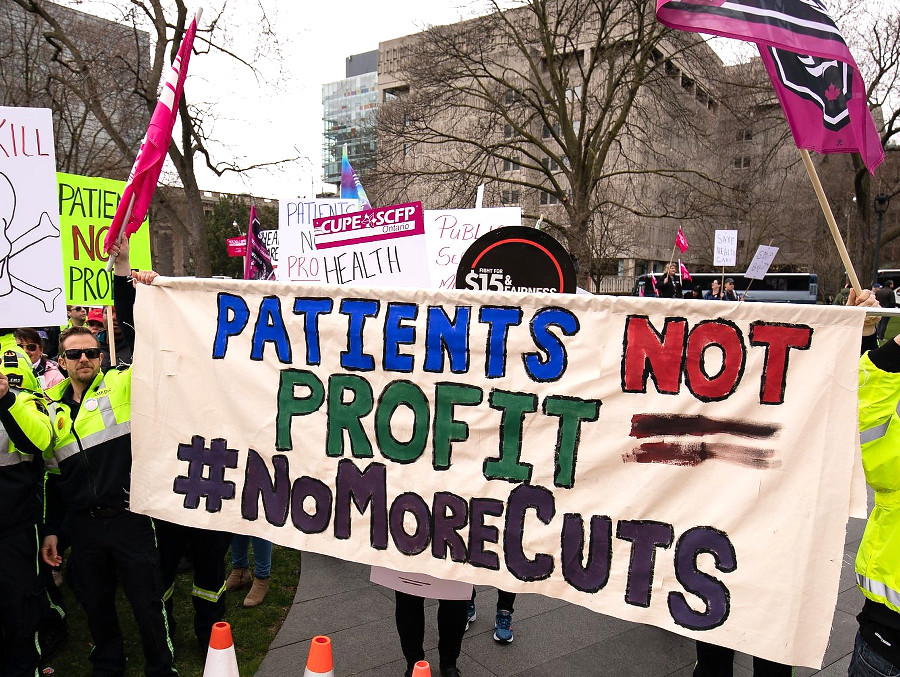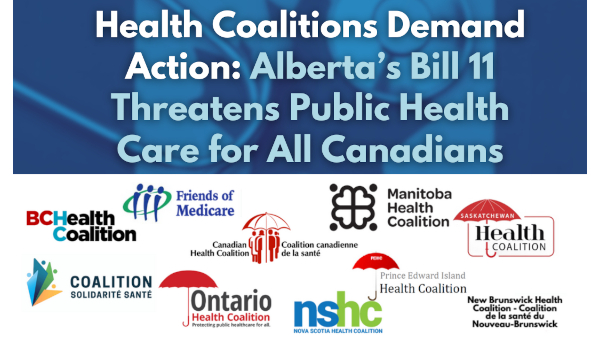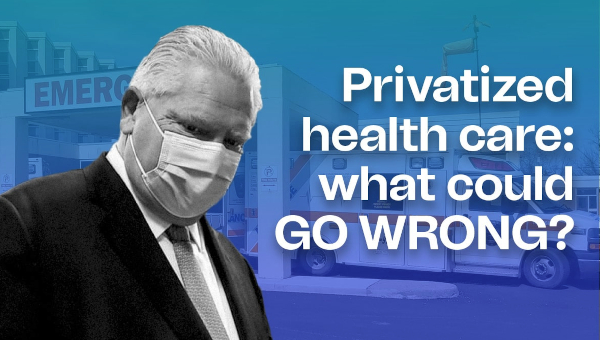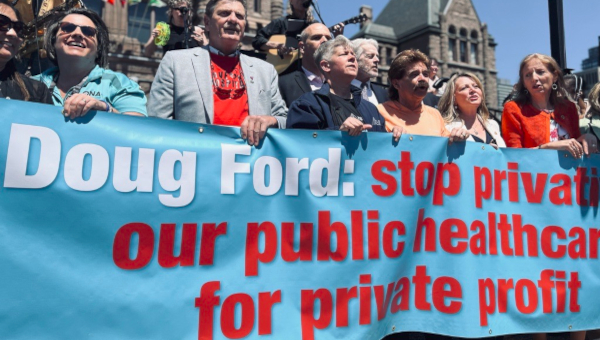The Anti-Union Virus Inside the Emergency Powers: Lessons for Workers
While the Covid virus weakens immune systems, it fortifies the anti-union animus of right-wing governments.
When it was clear that there was no way the coronavirus was going to exempt Ontario from its ravages, Ontario had to react. The problem was that, even though Toronto had been one of the epicentres of the SARS epidemic, years of neoliberalism had created a deplorable state of unpreparedness. There were fewer hospital beds per capita than ever. Ontario had slipped to having the lowest number of beds per capita in Canada and had no stockpiles of personal protective equipment. After SARS, an effort had been made to stock some equipment but when it reached its use-by date, in true neoliberal fashion, the government decided not to replace it. The rationale? In the unlikely event the equipment would ever be needed, it would be more efficient to rely on just-in-time supply from far away countries with cheap labour. Now governments and health providers compete fiercely with everyone in the advanced world for essential equipment, such as personal protective equipment (PPE), testing tools, and ventilators. And people die.

The health system, enfeebled and lacking the specific resources needed, had to be beaten into shape, co-ordinated, made flexible and supple. Government had to step in. It made sense. The Doug Ford government in Ontario gave itself extraordinary powers to do so. As it did so, it also gave full rein to the anti-working-class ideology that imbues the Ford government and all other right-wing Canadian governments.
Extraordinary Powers
Specifically, on March 17, the Ontario government invoked the Emergency Management and Civil Protection Act, a little known statute that grants the government extraordinary powers in times of emergency, including the power to make a wide range of orders. Four days later, on March 21, the government issued an order empowering hospitals and health service providers “to take, with respect to work deployment and staffing, any reasonably necessary measure to respond to, prevent and alleviate the outbreak of the coronavirus (COVID-19) (the “Virus”) for patients.” The order made it clear that the power of these employers to take more control over their operations and work forces was not to be limited by any statute (except the Occupational Health and Safety Act), regulation or collective agreement provision that might otherwise apply. Presumably, this would help empower employers to deliver the services that are so badly needed but which existing laws and collective agreements limit employers from providing in some unspecified ways.
In the days and weeks that followed the government issued additional orders granting similar powers to employers in many other sectors whose operations relate to or are affected by the current crisis. A partial list includes long-term care homes, retirement homes, municipalities, and various agencies providing social services. Our specific focus here is on the orders related to health providers and long-term care facilities, but it is clear that this is only one manifestation of the government’s reflexive view of collective bargaining as an impediment to efficiency.
Workers and Their Collective Power
Now, it is not a secret that Canadian employers have never liked collective bargaining. Collective agreements typically require them to pay higher wages and provide better benefits, and, just as importantly, limit their flexibility in deploying their workers as they see fit. In short, workers form unions to diminish the absolute control employers have over their employees as to what work to do, when to do it, who shall do it, how it should be done, how much time they will have to do it, that is, workers need to curb managerial prerogatives. More, collective bargaining, by eliminating competition among workers for scarce jobs, leads to better terms and more security than they could carve out as individuals bargaining in a competitive setting. The new powers given to health providers and long-term facility operators, among others, has put all this in danger.
The Ford government order is very specific about this. It provides that hospitals and health services providers may do the following:
- redeploy employees to different locations,
- redeploy staff to work in COVID-19 assessment centres,
- change work assignments (including assigning non-bargaining unit employees to perform bargaining unit work),
- change schedules or shift assignments,
- defer vacations or leaves,
- employ extra part-time or temporary staff or contractors, including to perform bargaining unit work,
- use volunteers to perform work, including bargaining unit work.
These are powers reinstating absolute managerial prerogatives; they are powers that strip workers of any rights and have the potential to deprive workers of any voice in decision-making over how to meet staffing needs in the current emergency. The promise that our system of collective bargaining would provide workers with the barebones of industrial citizenship is being dishonoured.
And why? Was there even a hint that it was the inflexibility of binding collective agreements that stood in the way of meeting the new demands made of the hospitals and health services’ providers? To our knowledge, in no case were unions consulted about the necessary measures, nor was there any evidence that employers who were given these exceptional powers had encountered problems in achieving their missions by the conduct of their unionized workforces and the unions representing them. Instead, what we witnessed was the reflexive impulse of governments to adopt coercive measures restricting collective bargaining rights as a first response to perceived challenges. The government instinctively felt that there was an opportunity to further embed the decades’ long assault on unionism in the public sectors.
To clarify this, some context will help. Following World War II, private and public-sector collective bargaining expanded, albeit unevenly, and many workers benefited. However, this post-war accord began to break down in the 1970s, and over the last 40 years or so, private-sector employers have increasingly avoided or escaped the collective bargaining regime altogether. As a result, private-sector collective bargaining coverage has dropped sharply, so that in February 2020, less than 16 per cent of private-sector workers were covered by a collective agreement. Public and para-public-sector employers have not been nearly as successful; in February 2020, nearly 77 per cent of public-sector employees were covered by a collective agreement.
While political and, now, constitutional restraints, prevent public-sector employers from escaping collective bargaining in its entirety, they have not stopped them from seeking to limit it, often justifying their measures on the claim that an emergency, real or perceived, exists.
The Neoliberal Turn
This strategy played a prominent role from the very moment when governments shifted from modest support for collective bargaining toward its containment as part of the neoliberal turn, which re-imposed the primacy of market ordering at the expense of institutional arrangements that had been adopted to protect the public welfare. A signal event was the imposition of national wage-and-price controls by the government of Pierre Elliot Trudeau in 1975. This measure was constitutionally problematic because normally the federal government does not have the power to regulate employment relations, which fall primarily within provincial jurisdiction. The federal government therefore needed a legal justification to defend this extraordinary exercise of power. It claimed an economic crisis existed, imperilling the well-being of the people of Canada and requiring Parliament’s stern intervention in the interests of the country as a whole. However, the government only offered this is justification after it enacted the law and its constitutional power to do so was challenged. That made no difference to the majority of the Supreme Court of Canada, which took the view that such justification was sufficient if a rational basis existed for believing there was an economic emergency.
The legal lesson was clear: claims of an apprehended emergency justified the exercise of extraordinary state power to attack labour rights. And so too was the political lesson. While workers conducted a one-day strike to protest the legislation, the government did not pay any political price for its actions.
The actions of the Trudeau government in 1975 ushered in the beginning of an era aptly named “permanent exceptionalism”1 during which Canadian governments have enacted numerous measures limiting public-sector collective bargaining. These limitations take many forms, including wage controls, restrictions on the scope of issues that can be bargained, and expansion of the categories of workers deemed essential and, therefore, subject to limits on their freedom to strike. As well, governments have removed collective bargaining restrictions on the freedom of public and para-public-sector employers to redeploy workers as they see fit. In addition, all governments of all political stripes have used back-to-work legislation whenever they felt that striking workers might get a bargaining advantage, from postal workers to municipal garbage collectors. The excuse in each case is that the work they do is essential.
The government of British Columbia exemplified this “restrict first” reflex when it enacted the mischievously named Health and Social Services Delivery Improvement Act2 in 2002. The legislation overrode existing collective agreements to provide employers with greater freedom to redeploy their workers through transfers and reassignments, to contract out work, to reduce job security and to deprive workers of seniority rights. The government justified these “exceptional” measures on a perceived crisis in the healthcare system due to rising demand and rising cost. However, unlike temporary wage and price controls, these changes were to be permanent, as the law prohibited bargaining on these issues in the future. The government enacted the law without attempting to consult with the affected unions, even though the unions had expressed an interest in discussing these matters.
As many readers will know, the unions challenged the constitutionality of the legislation, claiming that it violated a constitutionally protected Charter of Rights and Freedom’s guarantee of freedom of association. To many people’s surprise, including the BC government’s, the Supreme Court of Canada accepted the union’s argument, and for the first time, recognized that freedom of association extends to protecting a limited right to collective bargaining. As a result, the legislation could only be upheld if the BC government could satisfy the court that the violation of labour’s rights was demonstrably justified in a free and democratic society. In response, the BC government argued that there was a healthcare crisis requiring this extraordinary response. While the court recognized that improving healthcare delivery was a pressing and substantial objective and that the measures taken were rationally connected to the achievement of that objective, it rejected the government’s argument that its actions were minimally impairing, in part, because the government had not meaningfully consulted with the unions prior to legislating.
In Ontario, the government did not have to invent a crisis and it is likely that any subsequent legal challenge to the issuing of the emergency powers would face difficulties, as most judges would believe that there was a crisis to which an immediate response had to be made. Still, what is to be noticed is that, despite the now well-established legal doctrine requiring that, before governments override collective bargaining rights, they are obliged to consult with the unions and their members, the Ford government made no effort to do so. If they had, it is likely that they would have received many practical solutions and expressions of willingness to be as helpful as possible from healthcare workers and their unions, none of which would have required a rolling back of legally enforceable rights and privileges.
Anti-Union Bias
This speaks to the anti-union bias that inheres in the issuing of emergency orders. This is made more obvious by what the government did not do. Under the emergency-powers legislation, the government has the power to issue orders about the production and allocation of resources, equipment, and the like. And the emergency legislation permits the regulation of prices They could be telling private actors what to make, how to distribute it and how much they should charge for it. None of this is being done, despite the fact that there is a desperate shortage of personal protective equipment (PPE) which endangers the public and the workers who care for those who are already ill or who are at high risk of infection in places such as nursing homes, now the site of a disproportionate COVID-19 fatalities. The government recently acknowledged this reality in the context of a remarkable case in which the Ontario Nurses Association successfully applied for an injunction requiring long-term care homes to provide such equipment:
“They [the government] contend that the ‘harsh reality that quantities of certain forms of PPE such as N95 masks are limited and in demand across the world, the allocation of those masks to one group may well lead to masks not being available to other healthcare workers working in equally risky circumstances’.”
And still the government does not exercise its emergency powers to require capital to redeploy its resources to produce this vitally-needed equipment. Rather, it is workers who must be pushed and shoved to save society’s bacon. And there is to be no shouldering of the responsibility for bringing the healthcare system (and many other public services) to the impoverished and enfeebled state that makes the pandemic so much harder to combat than it might have been. The fact that it was the for-profit centres that attacked the social wage, that preferred outsourcing manufacturing capacities to places where labour was not protected and not unionized, that fought fiercely against any attempts to have health, safety and protective regulations set and/or to be enforced, that demanded that potential for-profit centres be privatized, such as long-term care facilities, that it was the avaricious capitalists who did so much to aggravate the virus-spawned crisis does not warrant a second thought. It does not move governments, like the Ford crew, even to think that the profiteers should be ordered to help.
Workers and only workers are to bear the burdens. What workers get is a name: ‘Heroes’. The animus that imbues the use of the emergency orders is there for anyone to see.
However, in a weird way, this may be useful. What this pandemic is making clear is that in our modern political economy, so much that is valued highly – leisure, travel, smartphones, trading useless pieces of paper – is rather unimportant. We see that healthcare, social service provision, food, public transportation, etc. are what is truly necessary for us to live secure and meaningful lives, and it is the workers who provide these services – disproportionately female, racialized, new immigrants, and low paid – and who are the most essential contributors to our well-being. Yet, what is obvious to most of us, is not seen by the political class that serves capital. Thus, while rightly designating health services as essential services, the Ford government’s emergency decrees also declared that “capital markets” constitute an essential service. “Pay-day lenders” are essential in this view of society. This failure to distinguish the making of money from working to serve human needs is the core of the problem.
When all this is over, the internalization of the lesson to be learned from the pandemic could help progressive activists. They should be armed with ammunition that will resonate with the larger public: workers were called upon to save us all; workers should be fairly compensated and given a central role not only in their workplaces, but in our social, political, and economic decision-making. •

Endnotes
- Leo Panitch and Donald Swartz, From Consent to Coercion: The Assault on Trade Union Freedoms, 3rd ed. (Garamond, 2008).
- Health and Social Services Delivery Improvement Act, S.B.C. 2002, c. 2.





